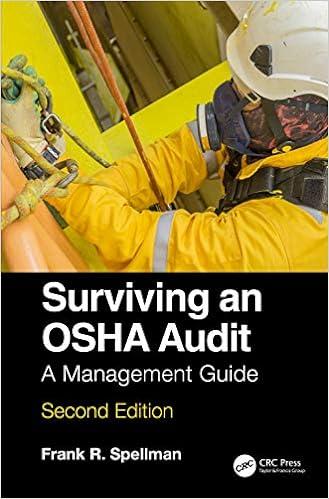Question
Weighted Average Cost of Capital (WACC) Using input from an investment banking firm, Clarkson estimates the company's cost of equity to be 18%. Their bank
Weighted Average Cost of Capital (WACC)
Using input from an investment banking firm, Clarkson estimates the company's cost of equity
to be 18%. Their bank has indicated a long-term bank loan can be arranged to finance the new
equipment at an annual interest rate of 12% (before tax cost of debt). The bank would require the loan
to be secured with the new equipment. The loan agreement would also include a number of restrictive
covenants, including a limitation of dividends while the loans are outstanding. While long-term debt
is not included in the firm's current capital structure, Clarkson believes a 30% debt, 70% equity capital
mix would be appropriate for Cape Chemical. Last year, the company's federal-plus-state income tax
rate was 30%. Clarkson does not expect the income tax rate to change in the foreseeable future.
Used Equipment
The used equipment will cost $105,000 with another $15,000 required to install the equipment.
The equipment is projected to have an economic life of three years with a salvage value of $9,000. The
equipment will provide the capacity to blend an additional 800,000 gallons annually. The variable
blending cost is estimated to be $.20 per gallon. The equipment will be depreciated under the Modified
Accelerate Cost Recovery System (MACRS) 3-year class. Under the current tax law, the depreciation
allowances are 0.33, 0.45, 0.15, and 0.07 in years 1 through 4, respectively. The increased sales volume
will require an additional investment in working capital of 2% of sales (to be on hand at the beginning
of the year).
New Equipment
The acquisition of new equipment with the capacity to blend 1,600,000 gallons annually is the
second alternative. The new equipment would cost $360,000 to acquire with an installation cost of
$60,000 and have an economic life of seven years and a salvage value of $60,000. The new equipment
can be operated more efficiently than the used equipment. The cost to blend a gallon of material is
estimated to be $.17. The equipment will be depreciated under the MACRS 7-year class. Under the
current tax law, the depreciation allowances are 0.14, 0.25, 0.17, 0.13, 0.09, 0.09, 0.09 and 0.04 in years
1 through 8, respectively. The increased sales volume will require an additional investment in working
capital of 2% of sales (to be on hand at the beginning of the year).
REQUIREMENTS
Assume the role of a consultant, and assist Clarkson to answer the following questions.
137
Journal of the International Academy for Case Studies, Volume 16, Number 5, 2010
Calculate the Cash Payback Period, Discounted Cash Payback Period, NPV, IRR and MIRR for
each alternative. For the calculations, assume a WACC of 15%. Based on the results of these
methods, should either option be selected? Why? Solution requires preparation of a spreadsheet.
Stewart is concerned that the projected annual sales growth rate of 15% for incremental blended
material may be optimistic. Recalculate the Cash Payback Period, Discounted Cash Payback
Period, NPV, IRR and MIRR for each alternative assuming the annual sales growth rates of 10%
and 5%. Assume a WACC of 15%. Does the change in growth rate alter the recommendation
made in question 5? Solution requires preparation of spreadsheets. Explain.
The projected cash flow benefits of both projects did not include the effects of inflation. Future
cash flows were determined using a constant selling price and operating costs (real cash flows).
The cash flows were then discounted using a WACC that included the impact of inflation
(nominal WACC). Discuss the problem with using real cash flows and a nominal WACC when
calculating a projects Discounted Payback Period, NPV, IRR and MIRR.
Step by Step Solution
There are 3 Steps involved in it
Step: 1

Get Instant Access to Expert-Tailored Solutions
See step-by-step solutions with expert insights and AI powered tools for academic success
Step: 2

Step: 3

Ace Your Homework with AI
Get the answers you need in no time with our AI-driven, step-by-step assistance
Get Started


